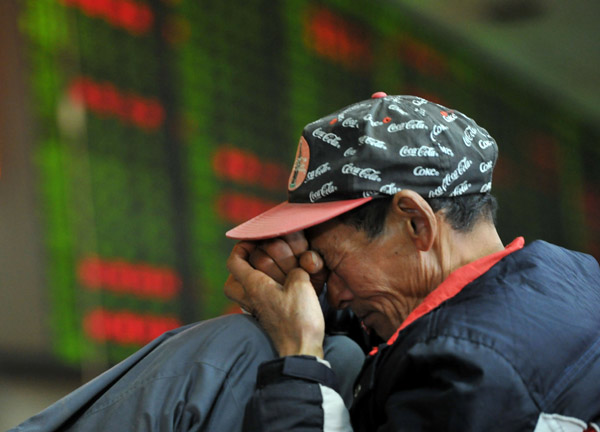Bird flu fears see stocks hit lowest level in 2013
Updated: 2013-04-09 09:23
By Xie Yu in Shanghai (China Daily)
|
||||||||
 |
|
A man at a brokerage in Nanjing, Jiangsu province. The Shanghai Composite Index closed at 2,211.59 on Monday, down by 0.62 percent. [Liu Yifan / For China Daily] |
Despite a late-afternoon rally, Chinese stocks slumped to their lowest level in 2013 on Monday, with sectors such as aviation and hospitality hit hardest by the bird flu scare.
The market opened after the three-day holiday break down 1.31 percent on the previous close. Prices stabilized somewhat after the lunch break, with the Shanghai Composite Index closing at 2,211.59, down 0.62 percent from 2,225.30 on the last trading day before the holiday. Daily turnover reached 73.7 billion yuan ($11.9 billion), up from 68.8 billion yuan previously.
Li Xin, an analyst with Changjiang Securities, said: "Currently, there is no effective way to curb the spread of new H7N9 bird flu. Some investors are worried it may lead to disasters like the SARS epidemic. Thus, it is natural that shares in the tourism and aviation industries fall. The index may fall even further if more economic data turn out to be discouraging.
Xun Yugen, an analyst with Haitong Securities, said it still takes time to evaluate the effect of bird flu.
In the 2003 SARS outbreak, sectors including retail, aviation, hospitality, farming, forestry, husbandry and fisheries saw the biggest drop. Pharmaceutical stocks rose in the early stages of the outbreak, but did not maintain strong growth in the middle and latter stages.
Analysts said they believe that weaker-than-expected growth indicators have also contributed to the depressed market.
China's official manufacturing Purchasing Managers' Index rose to an 11-month high of 50.9 in March, according to the National Bureau of Statistics.
Although it is above the 50-point level that indicates growth, it missed expectations. Analysts said this indicates the economic rebound remains fragile, with unsteady foreign demand for Chinese exports remaining a constraint.

 Li Na on Time cover, makes influential 100 list
Li Na on Time cover, makes influential 100 list
 FBI releases photos of 2 Boston bombings suspects
FBI releases photos of 2 Boston bombings suspects
 World's wackiest hairstyles
World's wackiest hairstyles
 Sandstorms strike Northwest China
Sandstorms strike Northwest China
 Never-seen photos of Madonna on display
Never-seen photos of Madonna on display
 H7N9 outbreak linked to waterfowl migration
H7N9 outbreak linked to waterfowl migration
 Dozens feared dead in Texas plant blast
Dozens feared dead in Texas plant blast
 Venezuelan court rules out manual votes counting
Venezuelan court rules out manual votes counting
Most Viewed
Editor's Picks

|

|

|

|

|

|
Today's Top News
Boston bombing suspect reported cornered on boat
7.0-magnitude quake hits Sichuan
Cross-talk artist helps to spread the word
'Green' awareness levels drop in Beijing
Palace Museum spruces up
First couple on Time's list of most influential
H7N9 flu transmission studied
Trading channels 'need to broaden'
US Weekly

|

|







